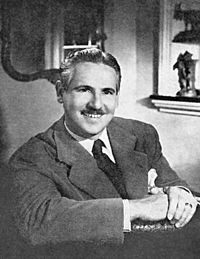Carlos Prío Socarrás facts for kids
Quick facts for kids
Carlos Prío Socarrás
|
|
|---|---|
 |
|
| 11th President of Cuba | |
| In office October 10, 1948 – March 10, 1952 |
|
| Vice President | Guillermo Alonso Pujol |
| Preceded by | Ramón Grau |
| Succeeded by | Fulgencio Batista |
| 5th Prime Minister of Cuba | |
| In office October 13, 1945 – May 1, 1947 |
|
| Preceded by | Félix Lancís Sánchez |
| Succeeded by | Raúl López del Castillo |
| Personal details | |
| Born | nationality July 14, 1903 Bahia Honda, Cuba |
| Died | April 5, 1977 (aged 73) Miami Beach, Florida, United States |
| Resting place | nationality |
| Political party | Cuban Revolutionary Party (Authentic) |
| Spouses | Gina Karell Mary Tarrero-Serrano |
| Relations | Antonio Prío (brother), Celia Touzet |
| Children | Rocio Guadalupe Prío-Karell Maria Antonetta Prío-Tarrero Maria Elena Prío-Tarrero Carlos Prio-Touzet Rodolfo Prio-Touzet |
| Parent |
|
| Alma mater | Colegio de Belen University of Havana |
| Profession | Attorney |
Carlos Manuel Prío Socarrás (born July 14, 1903 – died April 5, 1977) was an important Cuban politician. He became the President of Cuba in 1948. However, his time as president ended when a military takeover, led by Fulgencio Batista, happened on March 10, 1952. This was just three months before new elections were supposed to take place. Carlos Prío was special because he was the first president of Cuba who was born in an independent Cuba. He was also the last president to be chosen through fair, public elections. After the takeover, he moved to the United States, where he lived for 25 years. He passed away at the age of 73.
Carlos Prío's Time as President
In 1940, Carlos Prío was chosen as a senator for the Pinar del Río Province. Four years later, his friend Ramón Grau, who was also part of the Partido Auténtico political party, became president. During Grau's time as president, Prío held several important jobs. He was the Minister of Public Works, the Minister of Labor, and even the Prime Minister.
On July 1, 1948, Carlos Prío was elected president of Cuba. He was a member of the Partido Auténtico. He worked with General Genobebo Pérez Dámera, who was the Chief of the Armed Forces, and Colonel José Luis Chinea Cardenas.
People called Prío el presidente cordial, which means "the cordial president." He was known for being friendly and respectful. He believed strongly in freedom of speech. During his presidency, many public building projects were started. He also helped create a National Bank and a special court called the Tribunal of Accounts. These were some of his big achievements.
However, there were also challenges during Prío's time as president. There were problems with different political groups fighting. People also worried about fairness and honesty in the government. Many felt that Prío's government wasn't doing enough to stop these issues, similar to the government before him.
New elections were planned for the middle of 1952. But then, rumors started that Fulgencio Batista, who wanted to be president, was planning a military takeover. Carlos Prío didn't see a legal reason to act on these rumors, so he didn't do anything. The rumors turned out to be true. On March 10, 1952, Batista and his supporters took control of military and police stations across the country. They also took over major radio and TV stations. Batista took power when Prío, unable to fight back, left the country and went into exile.
About Carlos Prío's Family
Carlos Prío was married twice. His first wife was Inés Georgina (Gina) Karell Pedrosa. They had one daughter named Rocío Guadalupe Prío-Karell.
He later married María Dolores "Mary" Tarrero-Serrano on June 17, 1945. They had two daughters together: María Antonetta Prío-Tarrero and María Elena Prío-Tarrero. Carlos Prío also had two sons, Carlos Prio-Touzet and Rodolfo (Rudy) Prío-Touzet.
Carlos Prío passed away in 1977. He and his wife Mary are buried at Woodlawn Park Cemetery and Mausoleum in Miami, Florida.
Images for kids
See also
 In Spanish: Carlos Prío Socarrás para niños
In Spanish: Carlos Prío Socarrás para niños
 | Claudette Colvin |
 | Myrlie Evers-Williams |
 | Alberta Odell Jones |


